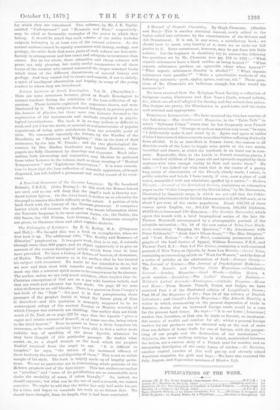The Philosophy of Existence. By E. G, K e ll ey, M.A. (Chapman and
Hall.)—We thought this was a book on metaphysics, when we first took it up. The additional title, "The Reality and Romance of Histories," perplexed us. It is a queer work, that is to say, it extends through more than 600 pages, and its object apparently is to give an account of the various theological beliefs which from time to time have prevailed. We have a history of deities, of heaven, of demonism, of Hafles. The author assures us in his preface that he has treated his subject with reverence. No doubt ho has intended to do so, but we now and then meet with remarks and reflections in which we must say that a reverent spirit seems to be conspicuous by its absence. The author, unless wo are very much mistaken, often implies that the Christian conceptions of God are on a par with heathen beliefs, and that not much real advance has been made. • On page 49 we note what strikes us as an odd blunder. There is a quotation from Cowper's last book of the " Task "—the poet is in fact paraphrasing those
i
passages of the prophet Isaiah in which the future glory of Zion ihi i
described—and this quotation is strangely supposed to be an extravagant eulogy of the ancient Persian or Magian worship, of which Cowper was certainly not thinking. Our author does not think much of St. Paul, as on page 223 he says that the Apostle "gives a vague and erratic account of himself, or of some one else, being taken -to the third heaven." Here he seems to have a little forgotten his reverence, or he would certainly have been able to find a rather more suitable way of speaking of the great Apostle, whatever he may have thought of this particular passage. He makes what see a stupid remark on the book • which the prophet Ezekiel received from the angel to eat. "It is difficult to imagine," he says, " the nature of the increased efficacy of
these books by the eating and digesting of them." This is not an unfair sample of his style. The book is largely made up of lengthy quota- tions. We see no particular use in transcribing whole portions of the
• Hebrew prophets and of the Apocalypse. This last strikes our author
as"peculiar," and "some of its peculiarities are so remarkable as to shake the credulity of some, if taken literally." So, indeed, we should suppose; but what can be the use of such a remark, we cannot
onceive. We ought to add that the writer has only laid aside his pen for a time, and hopes to conclude his work at no distant date. We should have thought, from its length, that it had been concluded.
































 Previous page
Previous page